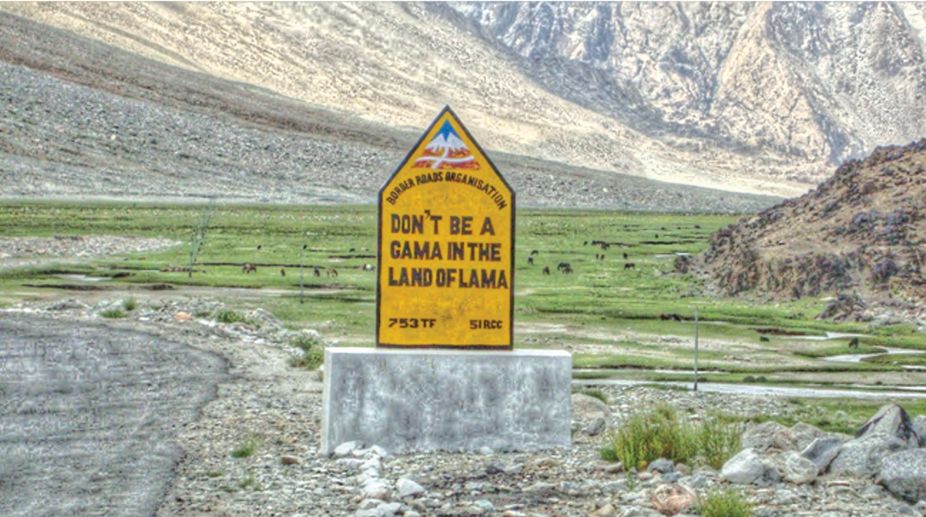The Border Roads Organisation (BRO) completed 58 years of its formation on 7 May and this takes me back in time when this piece originated from my pen.
My runner brought me an invite to Holi celebrations on 29 March 2002 at 755 Border Roads Task Force (BRTF) under Project Setuk of BRO at Agartala, Tripura. I was deployed at the Bangladesh border alongside 9 Parachute Field Regiment and 21 Sector Assam Rifles under Operation Hifazat.
Advertisement
Insurgency was at its peak. I called up to thank Colonel Abhay Trivikram Parnaik, SM, the Commander of the BRTF, for inviting me not knowing then that he would helm the same BRO as a Lieutenant General in times to come. I was a Lieutenant then.
BRO has been quietly strengthening the borders of our country for several decades. Primarily conceived to secure India’s borders and develop infrastructure in distant areas of the north and north-east states of the country, BRO now provides its services in foreign territories like Tajikistan, Afghanistan, Myanmar, and Bhutan, too.
When the Border Security Force (BSF) patrols an area or an Army Shaktiman moves over a border road, with troops on the alert, the efforts of BRO in assuring their effective movement hardly crosses their minds, perhaps due to the colossal operational task which awaits them.
The factors related to the work of the BRO and its execution brings to my mind the title of Dr Kiran Bedi’s autobiography- ‘I Dare’. It can be aptly said that BRO works where others shirk.
Basic necessities are rare luxuries in areas where BRO gives finishing touches to tasks that form an integral part of our history. Water used for general purpose is fetched from as far as 35 kms and potable water is courtesy a countryside waterfall. The nearest telephone is some 30 kms away and sometimes you don’t come across even a dog or a crow. Availability of newspapers is ruled out.
The huge quantities of dust on the way and at the work site, especially in scorching summers, ensures that personnel visit the Medical Inspection(MI) room often to deal with allergic bronchitis or farmers`lungs or helminthiasis or commonly known sweethearts such as chicken pox and pneumonia apart from water-borne diseases like cholera.
Malaria is another disease which has taken its toll on the BRO especially in outlying areas like Tripura where it has turned into an epidemic. The yearly malarial season lasts from March till October which constitutes 67 per cent of the working year in Tripura. The far-flung interiors of the workplace, great distances and lack of readily available transportation makes evacuation of patients a tedious, painful and prolonged process, resulting in some untimely deaths, too.
The condition of vehicles deteriorates everyday through constant wear and tear due to the continuous movement on virgin stretches – a compulsion to achieve targets within the stipulated period. A vehicle going sick creates additional pressure of covering vast areas with equipment on foot.
Another factor which regularly haunts their job is the presence of anti-national elements (ANEs). ANEs detest anything which affects their mission and building a foundation for smooth movement of our armed forces, near borders, is one thing which deprives them of their right of trespass.
Tripura has 847 km of porous border. In a few areas where militancy is more of a farce in the mask of extortion by way of kidnappings and hooliganism, the amount of money involved in BRO projects makes for a tempting proposition.
Threats, hence, often shadow BRO. The routine coercion either finds ransom or casualties. BRO`s history would be incomplete without the blood and sweat of its dedicated work force. Their sacrifice is no less than that of our Armed Forces but as they say, the show must go on.
Family life is a critical area of concern. The lack of decent and/or ample accommodation makes it nearly impossible for BRO personnel particularly at supervisory level and below to enjoy the closeness of their kith and kin; dependent parents are ruled out altogether.
The nature of duties, the location of work, unavailability of proper electricity and poor water supply multiplies their woes and leaves them with hardly any provision of accommodating their families.
Moreover, the official supply of fresh rations sometimes take four days to reach the detachments, which defeats the very objective of ‘thrice weekly fresh supply’. In areas like Tripura, there is paucity of standard schools which make matters worse for their children. To top it all, they enjoy only 30 days of annual leave, 12 days of casual leave & 15 days of half-paid leave.
However, there is always a silver lining beyond dark skies. The Government of India and the people of this great nation have always relied upon BRO for quick execution of quality work-a reason why jobs given to it have grown -and have reposed their faith in the organisation and its efficiency.
BRO does walk the talk, as it has always given its best and depicted true dedication to its task. BRO just needs to ensure that welfare of its personnel does not take a back seat due to the ever-increasing workload.
I often smiled when I glanced at one of the quotes in the 80 kg tent office of 78 Road Construction Company (RCC) in that remote part of India called Tripura – ‘Impossible may take a little time, Difficult shall be done immediately’.
The writer is a former Major of the Indian Army.











